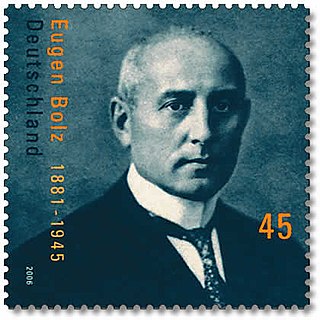Related Research Articles

Eugen Anton Bolz was a German politician and a member of the resistance to the Nazi régime.

Robert Uhrig was a German communist and resistance fighter against National Socialism.
Maria Eckertz was a German activist and politician (KPD). She took part in anti-Nazi resistance and narrowly avoided ending her days in Ravensbrück concentration camp.

Hermann Remmele was a German communist politician of the SPD, USPD and KPD. During exile in Moscow he carried the code name Herzen.
Paula Rueß was a German political activist (KPD). Forced into exile by the Nazi takeover, during the early 1940s she worked with the French Resistance.
Johanna Ludewig was a German politician. As a member of the Prussian parliament between 1921 and 1933 she was particularly active in the Communist Women's movement. During 1944 she survived approximately three weeks as an internee in the Ravensbrück concentration camp.
Maria Wiedmaier was a German political activist (KPD) who engaged in anti-fascist resistance during the twelve Nazi years. She spent most of that time in a succession of state detention institutions, ending the war as a survivor from the Ravensbrück concentration camp.
Hanna Rautenbach was a German politician (KPD).
Margarete Nischwitz was a German political activist and politician (KPD). She sat as a member of the Saxony regional parliament (Landtag) in Dresden between 1929 and 1933.

Bertha Thalheimer was a German left-wing peace activist who became a politician (KPD).

Frieda Unger was a German activist and politician who served as a member of the Parliament ("Landtag") of Baden. Her candidacy for the national parliament ("Reichstag") was not successful, however.
Lydia Poser was a German politician of the KPD and SED and widow of the executed Communist official Magnus Poser.
Ludwig Becker was a German politician, member of the Communist Party of Germany, and trades unionist who participated in illegal political opposition during the Nazi years.
Max Silbermann was a German politician. He served as a member of the Saxon regional parliament ("Landtag") between 1931 and 1933.
Barbara Esser was a German political activist (KPD) who sat as a Communist member of the Reichstag during the years of parliamentary deadlock that preceded the Nazi take-over.
Edwin Hoernle was a German politician (KPD), author, agronomist and a Marxist theoretician. He spent the Nazi period in Moscow where, during the final years of the Second World War, he was a founding member in July 1943 of the Soviet-backed National Committee for a Free Germany .
Eugen Wiedmaier was a German political activist and party official (KPD) who engaged in anti-fascist resistance after 1933. Following six years in solitary confinement, he died while detained at the main penitentiary in Ludwigsburg, during the first part of 1940. The death was reported as a suicide.
Helene Glatzer was a young Communist politician who after 1933 became a German anti-government resistance activist. She died - some sources state simply that she was murdered - following several days of questioning and torture at the police facility in the Hallmarkt district of central Halle.
Albert Kuntz was a German goldsmith, soldier, communist and concentration camp victim. A soldier in the First World War, Kuntz rose to become an elected representative of the German Communist Party in Berlin's Prussian Landtag. In 1933 he was arrested by the Gestapo, and sent to a succession of prisons and concentration camps. He died in January 1945 at the Mittelbau-Dora concentration camp, where he had been organizing the sabotage of the V-2 rocket production line. Following his death, he was revered as an anti-fascist hero in East Germany.
Adolf Rembte was a German communist and resistance fighter against the Nazi régime.
References
- 1 2 3 4 5 6 7 8 9 Hermann Weber; Andreas Herbst. "Walter, Maria * 27.9.1895, † 1.5.1988". Handbuch der Deutschen Kommunisten. Karl Dietz Verlag, Berlin & Bundesstiftung zur Aufarbeitung der SED-Diktatur, Berlin. Retrieved 27 March 2017.